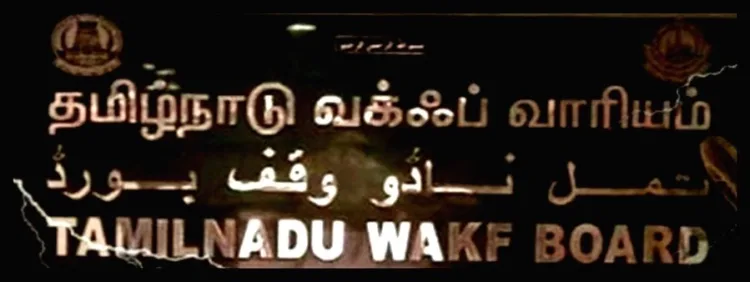The Tamil Nadu Waqf Board’s recent land claims have ignited a storm of controversy, leaving thousands of residents in Balasamudram Municipality in a state of despair. The Board’s audacious claim over the entire village in the Palani area, which first emerged in February 2020, has effectively trapped around 10,000 residents in legal limbo, unable to sell or even mortgage their ancestral properties. This isn’t just a legal tussle; it’s a battle over the livelihoods and futures of ordinary citizens who find themselves caught in a bureaucratic nightmare.
The situation in Balasamudram is not isolated. It’s eerily similar to what unfolded in Thiruchendurai, where the Waqf Board claimed ownership over 389 acres, causing massive disruptions to the lives of the residents. The Board’s actions have raised serious questions about its disregard for the impact on local communities, who have lived on these lands for generations. By asserting ownership based on outdated and questionable records, the Waqf Board appears to be playing a dangerous game with the lives of these villagers.
https://x.com/SaffronTweetz/status/1821896405428138152
Residents of Balasamudram, which consists of 18 wards, have been struggling with this property dispute for over three years. Despite petitioning local authorities, including Tahsildar Siva Kumar of Palani in May 2023, the community remains stuck in a quagmire of unresolved legalities. The Registration Department, citing the Waqf Board’s claim as per Re.No 786/2022, has refused to recognize the villagers’ ownership of their properties. Priyanka, a representative of the villagers, voiced the community’s frustration, stating, “The residents cannot mortgage their lands due to the Waqf Board’s claim. The Registration Department has indicated that the land belongs to the Tamil Nadu Waqf Board based on old VAO records, but discrepancies exist between the Waqf Board’s survey and the patta numbers.”
What makes this situation even more infuriating is the apparent double standard in the Registration Department’s actions. While the villagers have been prevented from registering their lands, the Department has inexplicably allowed others to buy and sell properties in the same area. This selective enforcement has only added to the villagers’ sense of injustice. Priyanka has rightly called for action against the officers who facilitated these registrations, which continued even after the Waqf Board issued a claim notice in 2022.
https://x.com/mattmurock123/status/1821891500432637963
The Waqf Board’s claims extend beyond Balasamudram. Similar disputes have surfaced in villages like Kadiakurichi, Erode, and even in areas around Chennai. The Board has not hesitated to claim temple lands, further escalating tensions. In a particularly troubling incident, residents of Old Vannarapet in Tirunelveli have reported being threatened in the name of the Waqf Board, pushing them to the brink of desperation.
The high-handedness of the Waqf Board is perhaps best exemplified by the remarks of its Chairman, Abdul Rahman, who recently asserted that there is nothing wrong with a temple being on Waqf property. Such statements reveal a blatant disregard for the cultural and religious sentiments of the affected communities, and highlight the Waqf Board’s willingness to use its power to assert control over lands, regardless of the human cost.
The legal framework surrounding Waqf properties in Tamil Nadu has only added to the confusion. A recent ruling by the Madras High Court in April 2024 declared the 2010 amendment to the Waqf Act of 1995 unconstitutional. The court ruled that encroachers of Waqf properties could only be evicted by Waqf tribunals under the Central Act’s 2013 amendment. This ruling underscores the inadequacy of the existing laws to protect the rights of residents who find themselves entangled in these disputes.
As the Waqf Board continues to assert its claims over vast tracts of land, the lives of thousands of residents hang in the balance. The Board’s actions have not only disrupted the real estate market but have also sown deep uncertainty and fear among ordinary citizens. It’s high time that authorities take a closer look at these claims and ensure that the rights of the people who have lived on these lands for generations are protected, rather than allowing the Waqf Board to play with their lives.



















Comments